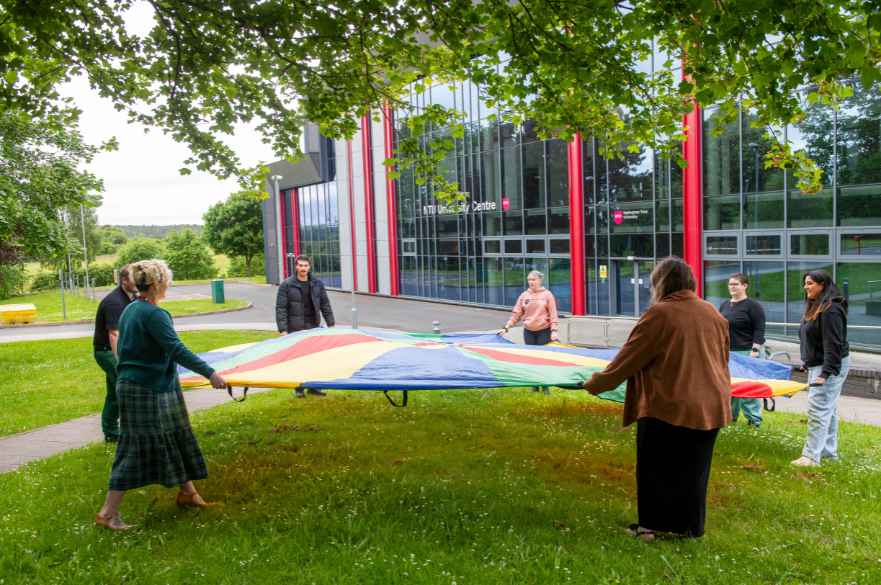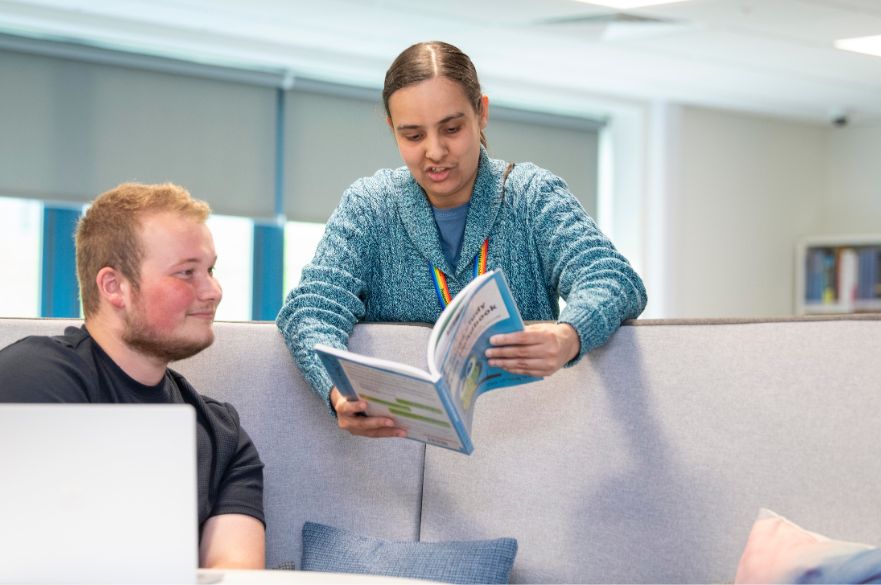Education: Policy and Practice BA (Hons)
About this course
This one year, part-time course is specifically designed to enable practitioners with an education related foundation degree or similar qualifications to gain full graduate status. It will equip you with the skills and knowledge to gain a greater understanding and critical analysis of education.
Students must be employed in an education setting for a minimum of 15 hours a week for the duration of the course and for two years prior.
This course is ideal for all educational professionals including:
- trainers
- teaching assistants
- learning support assistants
- non-graduate teachers
- and others working in education.
of BA (Hons) Education: Policy and Practice graduates were in work and/or further study 15 months after completing their studies (Graduate Outcomes Survey, 2020/21)
What you’ll study
This course provides people with 240 Higher Education credit points already achieved from previous studies to gain a full Honours Degree in Education. The course is offered on a part time basis, and you will achieve 120 credit points in one academic year.
On successful completion of this course, you will have developed a deep understanding education by examining polices, literature and theories from reliable and academic sources. This will include an exploration of current issues in which you will challenge arguments and assumptions of others. You will, by thorough planning of your dissertation, demonstrate the ability to problem solve and plan your own research.
By undertaking a systematic enquiry through primary research in modules one and three you will develop skills in applying research methodologies and techniques. Through the exploration of your findings, you will develop analytical skills to evaluate your own evidence in order to make judgements to improve practice. You will communicate your plans, ideas and findings effectively to both your tutors and your peers.
The aims of the course are to:
- enable educational practitioners to acquire coherent and detailed knowledge of their discipline;
- critically analyse your practice and make suitable recommendations for improvement.
This will be achieved with reference to aspects of current research in education, using these to devise and sustain arguments, to solve problems, or make reasoned judgements that affect education practices.
Education Research (20 credits)
- Studying this module, you'll investigate the role of education research as a tool to improve practice.
- You'll critically analyse current research, exploring and analysing the use of research instruments.
- You'll plan and undertake a small-scale research project of your own and evaluate your skills in the process. This will prepare you for the Dissertation module later in the course.
Education for All (40 credits)
- You'll critically analyse the impact of education policy on your practice through the lens of equal opportunities and social justice.
- You'll develop a detailed knowledge of an aspect of education that is pertinent to your workplace and undertake a critical review of this, making recommendations for improvement.
Dissertation (60 credits)
- You'll undertake a second research project within your workplace.
- You'll use peer feedback to develop your planning, undertake the research, critically evaluate arguments, assumptions and the data of current research undertaken by others and make recommendations to improve practice within your workplace.
- You'll undertake a review of your skills and knowledge, identifying how these contribute to your current practice or future career.
Students who successfully achieve modules 1 and 2 but not module 3 will be eligible for an Advanced Diploma in Education.
We regularly review and update our course content based on student and employer feedback, ensuring that all of our courses remain current and relevant. This may result in changes to module content or module availability in future years.
How you're taught
You'll learn through a combination of class discussions, practical activities, group tasks, group presentations and individual research tasks. The course will focus on the exploration of key educational issues using recognised research methods, followed by a dissertation. We predominantly run evening sessions however there is one weekend session, allowing you to continue working while you study. You will be assessed via a combination of coursework and other assignments, related closely to your own work context.
A one-day Conference is arranged as part of the input you will receive on the course, this falls during the second module. A range of speakers contribute to this event, enabling you to broaden your knowledge and understanding of the education sector.
Learn from our experienced staff
Our tutors are all experienced professionals who contribute to research and development within their specialist fields. Their research and influence not only shapes new educational practice, but also feeds directly into our courses, keeping you at the forefront of policy and practice.
Assessment
This is by coursework and assignments.
Placements
You are expected to be employed in an educational setting at the time of studying. Therefore the course does not offer placements.
Your future
This course can lead to a range of professional development opportunities. You may wish to progress to a recognised teacher training course to pursue a career in schools or post-compulsory education. Students also progress to Masters degrees.
How you're assessed
- Year 1 coursework (100%)
Contact hours
You will have around 10 – 12 hours per week of contact time (lectures, seminars or workshops) with our teaching staff which is around 30% of a full-time week. Approximately 90% of our teaching is in-person. The remaining 70% of your time will be devoted to independent study.
Careers and employability
Although this degree does not gain Qualified Teacher Status (QTS), progression onto a PGCE programme may be a future option.
Links with industry
We involve industry experts in our courses in a number of ways.
- We consult with employers when we design and update our courses.
- We ensure you are prepared to meet the demands of the workplace by continually checking the currency and validity of our courses with employers.
- Employers may input directly into your course through guest lectures, projects, and other work-related activities.
Learn a new language
Alongside your study you also have the opportunity to learn a new language. The University Language Programme (ULP) is available to all students and gives you the option of learning a totally new language or improving the skills you already have.
Learning a new language can:
- enhance your communication skills
- enrich your experience when travelling abroad
- boost your career prospects.
Find out more about the University Language Programme.
If you’d like to know more about NTU’s groundbreaking Employability Promise, and the support you’ll receive both during and after your course, visit our Careers and Employability page.
Campus and facilities
You’ll mainly be studying in the Ada Byron King building, home to Nottingham Institute of Education.
Our self-contained, community-focused Clifton Campus has been designed to keep our students busy between lectures. Catch-up with your coursemates in the Pavilion’s barista café and Refectory; brainstorm group presentations in chic and stylish study spaces; enjoy some proper R&R in The Point, home of our Students’ Union. The campus also hosts the multimillion-pound Clifton Sports Hub, offering great options for everyone — whatever your interests, and however competitive you’d like to get!
You’re also right next to the bright lights of Nottingham — one of Britain’s top 10 student cities, and one of Europe’s top 25. All through termtime, a dedicated on-campus bus service will get you to the heart of the action (and back) in under 25 minutes. You’ll find a city stuffed with history, culture, and well-kept secrets to discover at your leisure: enjoy lush green spaces, galleries, hidden cinemas and vintage shopping by day, and an acclaimed food, drink and social scene by night.
Take our virtual tour to get a real feel for the campus.
Entry requirements
UK students
Standard offer: 240 HE credit points (e.g. from the Cert Ed, PCES programmes or the FdA)
Other requirements: GCSE Mathematics and English at grade C, or equivalent, and a minimum of two years experience in an educational setting, working with children, young people or adults (minimum of 15 hours per week).
Additional requirements for UK students
Applicants would be expected to be employed within an educational setting at the time of studying and for the duration of the course.
Applicants will also be required to provide a vocational reference.
Contextual offers
If you don’t quite meet our entry requirements, we might be able to make you a lower offer based on a range of factors, including your background (such as where you live and the school or college you attended), your experiences and your individual circumstances (you may have been in care, for example). This is called a contextual offer, and we get data from UCAS to help make these decisions. We do this because we believe everyone with the potential to succeed at NTU should have the opportunity to do so, no matter what barriers you may face.
Other qualifications and experience
NTU welcomes applications from students with non-standard qualifications and learning backgrounds, either for year one entry or for advanced standing beyond the start of a course into year 2 or beyond.
We consider study and/or credit achieved from a similar course at another institution (otherwise known as credit transfer), vocational and professional qualifications, and broader work or life experience.
Our Recognition of Prior Learning and Credit Transfer Policy outlines the process and options available for this route. If you wish to apply via Recognition of Prior Learning, please contact the central Admissions and Enquiries Team who will be able to support you through the process.
Getting in touch
If you need more help or information, get in touch through our enquiry form.
International students
This course is not suitable for tier 4 visa applicants.
We accept qualifications from schools, colleges and universities all over the world for entry onto our undergraduate and postgraduate degrees. If you’re not sure how your international qualification matches our course requirements please visit our international qualifications page.
Additional requirements for international students
There are no additional requirements for this course.
Policies
We strive to make our admissions procedures as fair and clear as possible. To find out more about how we make offers, visit our admissions policies page.





